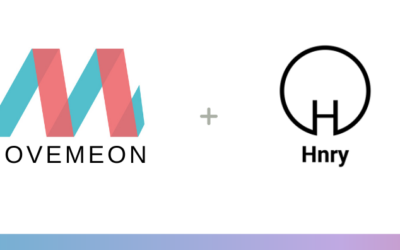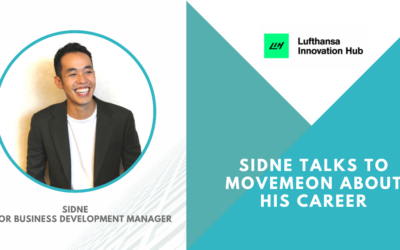Rania Guirguis is the CEO & Co-Founder of Gro Gro. She worked at Accenture and Roland Berger, and has extensive business development experience. Here, she spoke to Anna, Movemeon’s Head of Marketing about growing Gro Gro – and then preparing for her exit.
In your own words, please, tell us why you set up Gro Gro, and what the business does.
Gro Gro is a company that offers honest, supportive nutrition to babies. My partner Malin had come up with the idea, and I joined in close to 1.5 years ago because I really believed in the mission of the concept: to create a product that is convenient, but at the same time it is really good for the child – to remove the guilt that parents often feel when offering ready-made food to their child. This is what drew me to joining the venture and building it up.
We are really excited because we are just getting ready for the launch – preparing ingredients, testing with parents and children… So it’s all becoming real!
As a mother to a 1-year-old, I certainly feel the guilt you mention when I give my daughter ready-made food. How do you address this issue at Gro Gro?
This is something both Malin and I have also experienced as mums, during that phase of introducing solids. We heard it from lots of parents in the focus group too: they don’t always have time to start preparing food from scratch, but they want to give their child the best nutrition.
At the same time, we know that it’s not just what’s in the food, the process of preparing it is just as important.
Naturally, no food company would have refined sugar in baby food, but we’ve learnt that there are also parts of the preparation process that would make one product better than another. We use fresh raw materials, they haven’t been preheated, so you still get all the nutrients from the ingredients. Our products are cold-pressed using HPP, high pressure processing, to increase shelf stability so the product can last up to 3 months, but without impacting the nutrition, freshness and taste. A lot of products out there are not tasty at all, so this has been a very important element of our process.
So to address the guilt, we want to ensure our product is something children actually enjoy eating, and it’s not a struggle getting them to accept it. We’ve been testing the product with babies, and they seem to want more, which is the best way to reassure parents!
Making an exit is such a big decision, so what is the thinking process behind it, and what sort of things do you need to take care of to make sure it goes smoothly?
It has been a really hard decision – this venture is really close to my heart. Every piece that is there now, from the package to the logistics, is stuff that I’m building. But I feel that it’s time to let go because I believe that I could add more value somewhere else. I’m based in London and we have made the strategic choice to launch and grow in Scandinavia – I would have to relocate to be able to really manage the team as I would want to.
I like building something from scratch, and that is something that I can take on to other ventures. Some of the skills that I see as required for setting up ventures, I believe are my strengths, and I have also honed them as a consultant – from setting goals to project management as we set up operations… These are great skills I can take to my next ventures.
Knowing you plan to exit the company, are you still involved in the roadmap for the next 1 year, or 5 years, or however long it may be?
Absolutely, and I’m also planning my exit very carefully with my partner and with the shareholders. The roadmap is laid out, we’ll grow in Scandinavia, and then we’d like to enter into other markets. We’d be the first chilled baby food product in Scandinavia, which is something we want to leverage, and we want to launch as soon as possible – we see the market opportunity there. The trend for convenience is driving the demand, along with conversion to organic, healthier, cleaner products. We think we are very well-placed to capture that demand.
At the same time, something I’ve learnt is that the roadmap is very dynamic – the vision is stable, but how to get there is always a work in progress. So I will continue to be on Gro Gro’s Board of Directors. This way I can continue to provide input and support to the company in the future.
Do you already know what you will do next?
I’m not sure yet. There are a few things I’m looking at and I’m very excited – for sure, it’s going to be about creating impact.
If we could now ask you a bit about your consulting background, what was your motivation for moving out of consulting and to startups?
I moved first to industry roles as strategy director. In many ways, these roles are similar to consulting, but because they are internal the dynamics are very different. When I made that move, my rationale was to get closer to decision-making and to move to a general management role, and that was one step in that direction.
The move from that strategy function to a startup was about having that opportunity for general management, and for being in charge of something from A to Z, from scratch. That whole team development is really exciting to me, as is knowing that what I’m doing is actually bearing fruit. Going into a business with a purpose was also a big drawing factor. For the next step, I will be doing the same, also looking for a purpose-led business.
Many of our community leave consulting to get more time for themselves, was it the same for you?
This is a work in progress for me. After 20 years of working, I’ve discovered that it’s up to me to set boundaries. It’s not about the number of hours, it’s about setting realistic expectations for myself, and knowing what is important to me. Consulting or not, this is up to the individual. Of course, it’s easier now than as an analyst at the start of my career, but still, everyone can influence that environment for themselves.
A lot of consultants are high-achievers so that difficult work-life balance can come from self-inflicted expectations – while I don’t deny that the consulting setup is also difficult. Additionally, one thing I really wanted to do less of is travel, that I really did find tiring. I travel a lot now too, but I prefer planned travel, as opposed to the short-notice schedule changes of consulting.
In terms of tips for others, what would be your advice for anyone else looking to make their career more purpose-driven?
The key thing is to know what your priorities are, and to be honest with yourself about what these are, and remove all other barriers. Anything that’s not important can be cut out.
As a mum, something I also used to do is start with the things I cannot do, e.g. travel. I’ve come to realise that I should flip that – so start with what you’d like to do and then if you really want to do it, there will be a solution.
Do you have any tips for anyone that wants to start their own business, coming from a consulting background?
First, the consulting background is actually valuable for starting a business. All those skills we learn, from structuring communications to business management and financial planning are extremely relevant.
In terms of tips, I’d recommend networking & learning about that ecosystem a lot – there are conferences, incubators, talking to other founders. Then it’s also important to find a product you believe in, focusing on learning about areas you believe in. For me that was in food – the more I get into it, the more I find opportunities. Finally, it’s finding the right partner, someone that complements your skills, but also someone that has the same values and priorities.
As an ex-consultants, do you tend to hire ex-consultants?
Yes! It just works really well. My experience has been really positive with ex-consultants. They just get it. Because of this problem-solving mentality, and the ability to structure things, you know that you can just leave them with a task.


